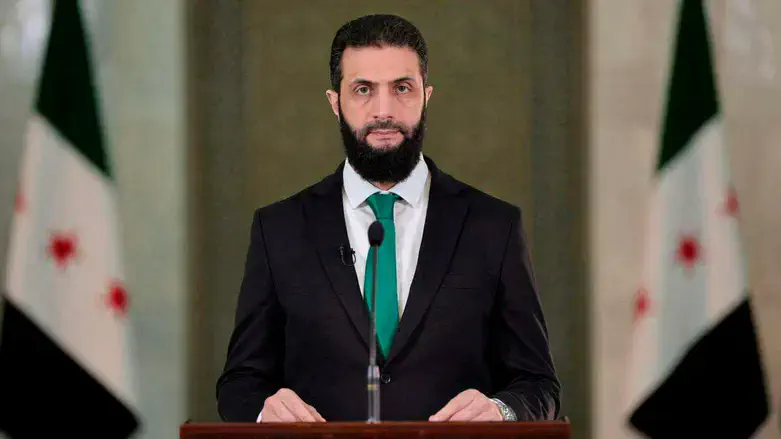
Yaakov Lappinis an Israel-based military affairs correspondent and analyst. He is the in-house analyst at the Miryam Institute; a research associate at the Alma Research and Education Center; and a research associate at the Begin-Sadat Center for Strategic Studies at Bar-Ilan University. He is a frequent guest commentator on international television news networks, including Sky News and i24 News. Lappin is the author of Virtual Caliphate: Exposing the Islamist State on the Internet. Follow him at: www.patreon.com/yaakovlappin.
(JNS) The Golan Heights experienced its first rocket attacks on Tuesday from Syria since the fall of the Assad regime, with the Israel Defense Forces retaliating and Israeli officials explicitly holding the new Syrian government under President Ahmed al-Sharaa responsible.
The IDF responded with artillery fire toward the launch sites in southern Syria—reportedly the village of Tasil in Daraa province, an area with a significant Palestinian Arab population and known for hostile elements. IAF fighter jets also attacked Syrian regime weapons systems in southern Syria.
Israeli Defense Minister Israel Katz directly warned President al-Sharaa that Israel would “not allow a return to the reality of October 7th” and that a “full response will come soon” if threats continued. Two obscure groups, the “Martyr Muhammad Deif Brigades” and “Islamic Resistance Front in Syria-Pioneers of Strength,” claimed responsibility for the launches.
Earlier, senior Israeli and Syrian intelligence and security officials engaged in direct, secret talks for several weeks focusing on security matters along their shared border and de-escalation mechanisms, Reuters reported on May 27.
The Reuters report, citing four regional officials and two Western diplomats with knowledge of the matter, indicated that the discussions were aimed at establishing a reliable communication channel and preventing misunderstandings that could lead to conflict.
While still at a preliminary stage, sources suggested the new Syrian leadership is keen to project stability to encourage international re-engagement, while Israeli officials are reportedly cautiously engaging on specific security issues to prevent a vacuum in southern Syria. The IDF did not comment on the report.
Dr. Dina Lisnyansky, an expert on the Middle East and radical Islamic movements who teaches at Tel Aviv and Reichman universities as well as at Shalem College, said that the rocket fire added a “new dimension” to the situation.
“In principle, our understanding until now was that, as part of the aspiration for normalization, al-Sharaa is supposed to effectively take control of hostile factions that are not necessarily Syrian. This means he needs to clear the entire area south of Damascus, and in general, of hostile Palestinian factions like Hamas or Islamic Jihad,” she stated.
Lisnyansky assessed that the groups claiming the recent rocket attacks were likely “phantom organizations …, meaning these are groups that are probably jihdist groups that may have pro-Hamas sentiment or Hamas affiliation. We don’t know if these are local Syrians who received money from Hamas or were ideologically recruited to Hamas.”
She characterized them as likely “remnants” rather than established, organized threats, but acknowledged that dealing with such small groups, alongside official Hamas and Islamic Jihad structures, pose “a very big challenge for al-Sharaa to remove them from Syria.”
While he did reach certain understandings and began pushing out Palestinian Arab terror organizations in a positive manner, she said, it still “cannot be said that he actively controls the entire area.”
This limited control is a critical factor, she argued. “It cannot be said that one can rely on al-Sharaa having full control regarding fire from the Syrian side toward the Israeli side. That means no matter how many talks we have, everything must be taken with a grain of salt. Even if there is a willingness on his part, the ability is still perhaps very limited.”
She pointed to ongoing discipline problems within al-Sharaa’s own diverse forces and defections by some of his supporters to jihadist groups due to dissatisfaction with his perceived “Western direction.”
The Syrian Foreign Ministry’s statement on June 3, claiming it had not yet confirmed reports of launches towards Israel, said that “many actors seek to destabilize the region.”
According to Lisnyansky, al-Sharaa’s primary motivation for engaging in talks with Israel and projecting moderation is to achieve “regime stability. He wants this regime’s stability. He says it explicitly that he wants a Syria that is economically stable and free of conflict.”
She explained that to achieve this, “al-Sharaa promised [President Donald] Trump that if sanctions were lifted from Syria, Syria would do what the United States wants. What does the United States want? That Syria enter the Abraham Accords and normalize with Israel on one hand, and on the other hand, that it also assists in building a pro-Western territorial continuum in the Middle East.”
Lisnyansky noted that U.S. sanctions had indeed been lifted, and al-Sharaa has taken some steps, such as expelling Hamas and Islamic Jihad leaders from Syria about a week earlier.
Despite these overtures, skepticism remains. Yaron Friedman, a University of Haifa researcher, lecturer, and teacher of Arabic at the Department of Middle Eastern and Islamic Studies specializing in Shi’ism and the Alawites in Syria, stated, without direct connection to the Reuters report, “I would be suspicious of any attempt by the new regime in Damascus to reach a supposed ‘arrangement’ on something that is already settled anyway, like non-belligerence. This is probably an exercise to curry favor with the U.S.”
Lisnyansky offered a final note of caution, suggesting the situation could still evolve negatively. “This could still be a double game in the end. A situation could arise where there is a jihadist-Turkish alliance together with the Syrians. This doesn’t mean that what is happening now cancels out the next thing; it means this could be an interim phase,” she warned.